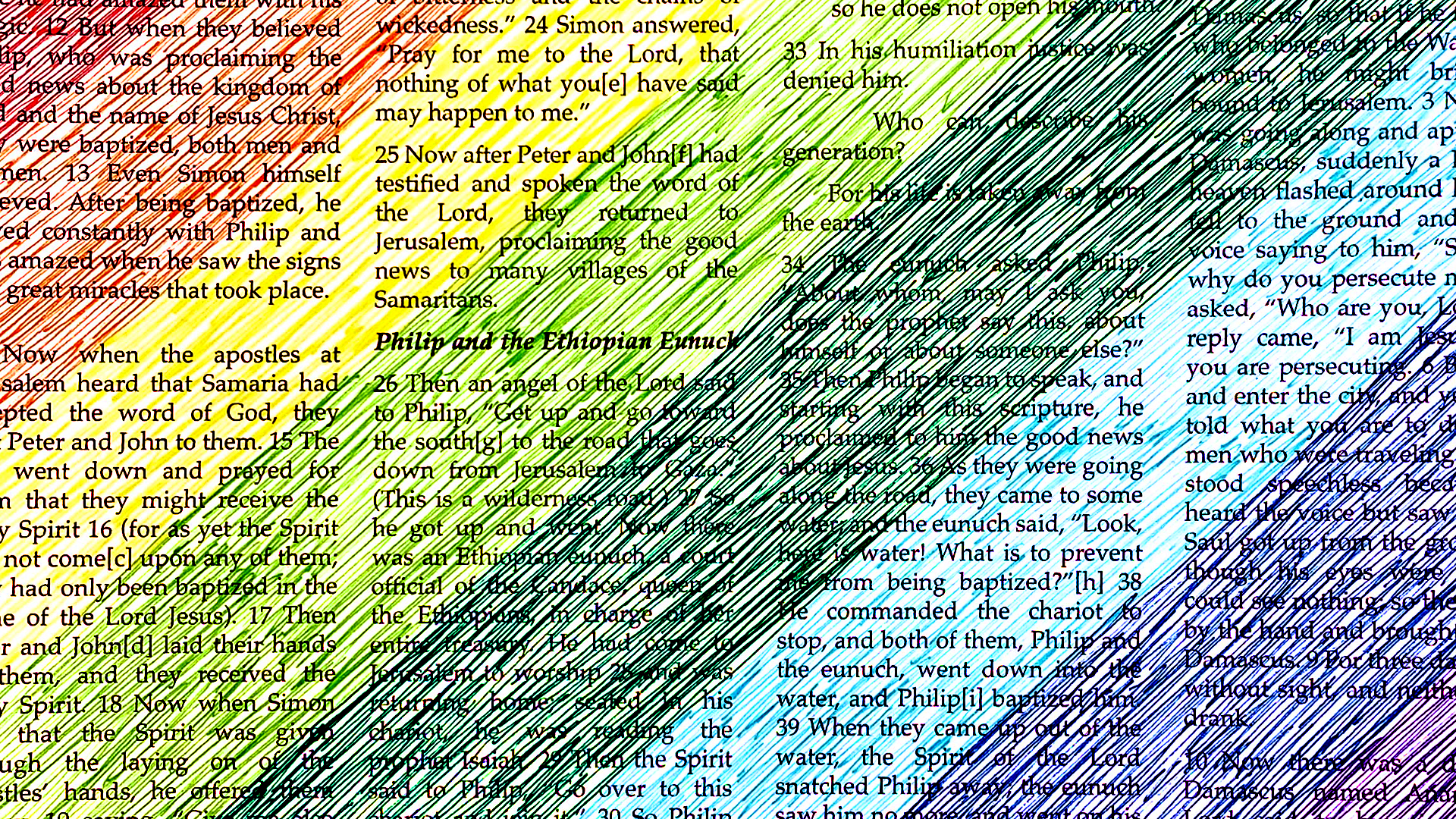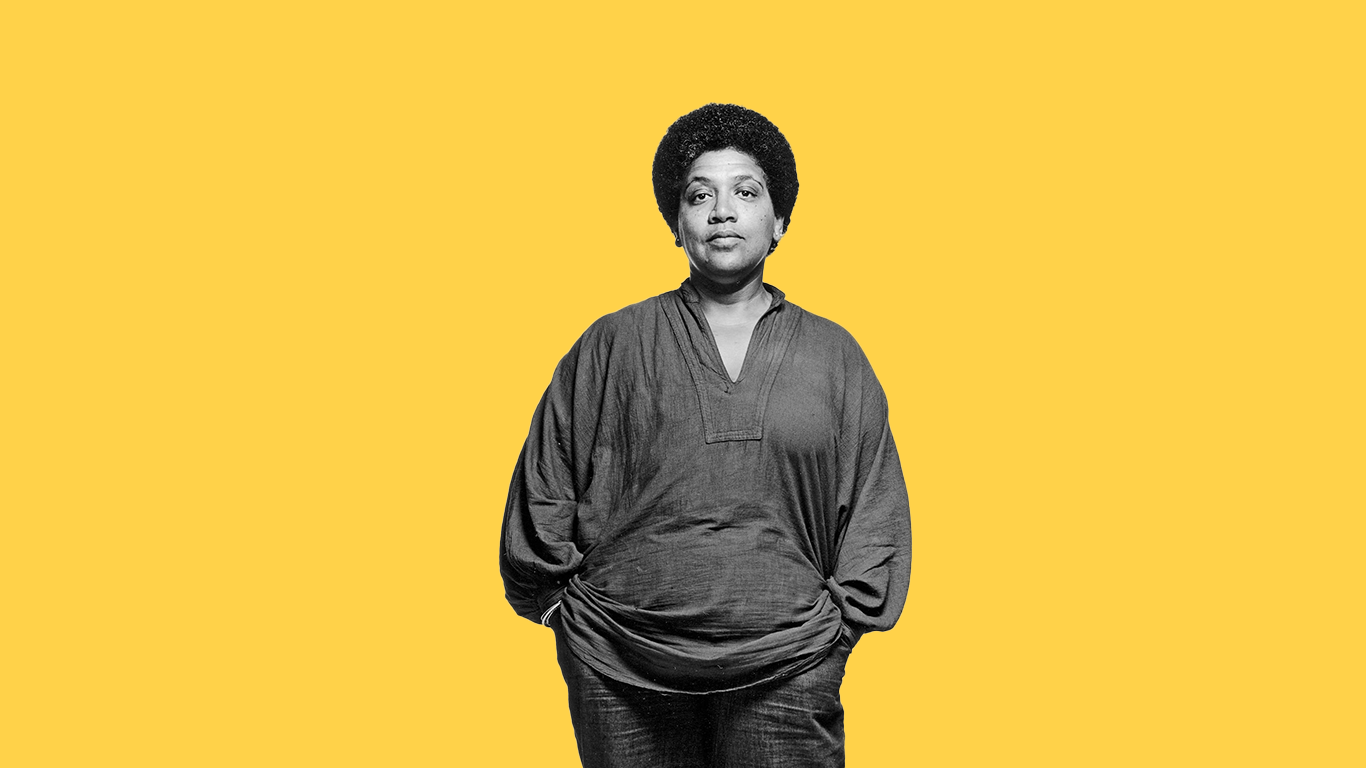
About
Queerness is a good thing.
We celebrate the existence, relationships, and contributions of queer people as gifts from God. It’s more than being “affirming,” because queerness is worth more than acceptance.
The Project
You might be wondering to yourself, how did all of this come together? What’s the deal with this Queer Hermeneutics class from Princeton Seminary? Fair questions! We are a collection of queer and ally students who saw queer perspectives on the Bible and theology as both beautiful and necessary, so much so that we dedicated 3 hours every Friday afternoon to this important work for a whole semester. Through our work, we have put together this resource to share, educate, and celebrate queer stories and queer-affirming tools. Because this work is connectional and vulnerable, we think it’s important to share some of who we are as contributors and why we devoted ourselves to this work. Take some time to get to know us!
Queerness & Sexuality
We recognize that "queer-positive" will remind some readers of the phrase "sex-positive." This is intentional. This phrase allows us to affirm our belief that sex is also a gift from God and that bodies and pleasure are not shameful. Additionally, it enables us to highlight the fact that queer people tend to be over-sexualized. While sex and gender are central aspects to queerness, they are not the only parts of queer identities.
Our name
"Word Made Queer" is an allusion to John 1. It means three things to us. First, it means that we provide new, "queer" methods of reading scripture. We "queer" the text and highlight what is already "queer" in it. Second, it means that Jesus, or the "Word" as he is called in John 1, made queerness. Queerness and queer people are a part of God's good creation—not signs of the Fall as many of us have been told. Third, it means that Jesus himself is "queer." What could be more queer than a person who breaks the ultimate binary of heaven and earth?
“For the master’s tools will never dismantle the master’s house”

Contributors
Lindsey Scott Jodrey
I am a queer Christian who was raised in a conservative evangelical context and began the process of accepting and celebrating the beauty of my queerness in my late twenties. Now, in my mid-thirties, I see my queerness as a gift that enriches my life, strengthens my faith, and contributes to my being a good friend and neighbor.
I am a teacher at heart, and I earned a PhD in New Testament from Baylor in 2016. I enjoyed working to enrich teaching and learning at Princeton Theological Seminary through the Office of Digital Learning. I LOVED teaching the first Queer Hermeneutics class at PTS. I care deeply about theological education, particularly how it helps us to consider the ways biblical interpretation affects the lived experiences of all people, especially those who have been oppressed or ostracized by the Bible or the Church.
I’m an ordained minister in the Alliance of Baptists. When I’m not working or teaching, you’ll find me eating good food, enjoying live music, playing a board game, or working on a poem while cuddling my pup, Abbot.
Becca Laabs
I'm Becca, and I have absolutely loved being a part of the Word Made Queer. I am currently in my second year of seminary and in the process of being ordained in the Evangelical Lutheran Church in America. This class and project has given me so many great opportunities to learn from my queer siblings, and I look forward to taking what I've learned into my ministry both inside and outside of the church. It has been such an honor to be a part of sharing all of these amazing stories!
Kevin Smoot
I’m Kevin and I’m a part of the Digital Storytelling team! I received my Bachelor of Science degree in Industrial Operations Engineering and I am currently a first year at Princeton Seminary. This project has meant a lot to me as a recently excommunicated queer person, allowing me to invest in robust and inclusive theology and reclaim the Bible as queer positive.
Ellen White
I am honored to participate in this project, as a member of the Digital Storytelling team. I am currently a student at Princeton Theological Seminary and an inquirer for ordination in the Presbyterian Church (U.S.A.). My degree program is focused on intergenerational ministry with young people, and I am working towards a certificate in theology, ecology, and faith formation. I have a Bachelor of Arts in Religion from the University of Mary Washington and enjoyed my years working in Washington, DC for Arena Stage at the Mead Center for American Theater. I care about faith, friendship, community, music, and nature. A few of my favorite things are coffee, stories, and adventures.
Kelly Spencer
I’m Kelly and I’m honored to have worked as the Editor-In-Chief for this project! I’m preparing to graduate from Princeton Seminary in May, which marks three of the best and most challenging years of my life - including my coming out and my engagement to a beautiful woman. After quite a few turns, I am glad to be in the ordination process in the PC(USA), which will open the door for me to continue serving the church. This project has meant a lot to me as a queer person because good theology that celebrates queer lives and names queer contributions as necessary is not shared as much as it needs to be. I invite you to take your time on this site and truly relish in the beauty of the stories and goodness presented herein!
Casey Aldridge
My name is Casey and I am in my third and final year of the MDiv degree at Princeton Theological Seminary in New Jersey. I grew up in Concord, North Carolina—outside of Charlotte—and was raised in faith at First Presbyterian Church of Concord. In high school and college, I found myself unimpressed by the social and political witness of the larger church, and, in many ways, I drifted away from the church. By way of many detours, I have returned to the church and am now a candidate for ordination in the PC(USA). My faith, however, is deeply formed by and bears the marks of those detours: from bearing witness to the Arab Spring and Occupy Wall Street movements of 2011 to learning political principles from Marxists, and from demanding justice for Keith Lamont Scott in September 2016 to working closely with unlikely allies in the environmental justice movement. I was introduced to queer theory through my involvement with the Feminist Union at UNC Charlotte as an undergraduate student, and I have the brilliant Dr. Kent Brintnall to thank for taking me deeper into queer theory prior to this Queer Hermeneutics course. I serve as an intern at Fifth Avenue Presbyterian Church in NYC, where I bring my questions about capitalism, the climate crisis, and queer theory into my work with youth and young adults every week.
Nii Addo Abrahams
I worked as one of the managing editors for the website, and I'm still blown away that I was given the chance to be a part of this project. I am a third-year student at Princeton Theological Seminary, and in May, my partner Haley (who is a doctoral student in occupational therapy) and I will be graduates and well on our way to spending the rest of our lives paying off our student loans! Working with and learning alongside the other folks you'll find on this page has been an incredible experience. My constant encounters with the beauty and creativity of queer lives have made me a better ally and a better person. I hope that you have a similar experience as you explore what we've created together.
Shawna
I’m Shawna! Hailing from the great state of Oregon, I am a third year Master of Divinity student at Princeton Theological Seminary. Before making my way out east, I served as a pastor of youth and families at a small Quaker church as well as the team chaplain for the women's basketball team at George Fox University for four seasons. I enjoy hiking, breakfast, donuts, March Madness, and all things sweet.
Riley Pickett
Hey I’m Riley and I am a queer Christian from the Gulf Coast studying at Princeton Theological Seminary. I will graduate in May 2020 with my Master of Divinity and I envision myself working in chaplaincy or congregational ministry. I was born and raised in the Presbyterian Church (USA) and is currently seeking ordination. After undergrad at the University of Mississippi, I taught middle school English. I then served as a Young Adult Volunteer in New Orleans, my hometown and favorite city, through the PC(USA)'s Mission Agency where I taught adult literacy, lived in intentional community, and started to feel a call to ministry and seminary. I am grateful to the PC(USA) for this opportunity and for playing a vital role in my early faith formation. When I’m not reading or working on a paper, you can find me on a long walk listening to a podcast, watching Netflix with my partner, or exploring a new town.
Wondering
Hi. I'm Wondering, a queer, twenty something who's found herself in Seminary because she just can't seem to shake the God thing despite the harm I see it having caused in the world. My being here may also have something to do with my deep and dorky love for liturgy. I am from the midwest and currently in the process of being ordained in the ELCA. I try to approach my future in ministry with a stance of curiosity, flexibility, and with a lot of room for the holy spirit. Working on this process has been a huge blessing to me as I've been completing the process of questioning, exploring, and learning how to celebrate my sexuality in a new way.”
Caroline
I'm Caroline, a seminary student at Princeton Theological Seminary getting ready to graduate in the spring. I am excited that a website like this will be out in the world resourcing churches, faith communities, and individuals and I am grateful to my brilliant classmates for sharing their insights, stories, and selves!
Michaela Silvis
Hello! I'm Michaela and I had the privilege of being a part of the creation of this wonderful website as a member of the Digital Storytelling Team. I am a second year student at Princeton Seminary pursuing a Dual Degree with a focus in youth ministry. I identify as a straight, biracial (mixed, Korean and White) woman. I see myself as an ally, advocate, learner, optimist, fan of Jesus, and lover of food. This project has been quite the endeavor and I am honored to be able to help contribute to it. I have learned so much through this course and I hope that this website helps celebrate and center queer lives and stories! Thank you for learning alongside all of us and I hope you can rejoice in the beauty of all that is here!
Anonymous
I'm a second year student at Princeton Theological Seminary and a lady pastor-in-training. I am a straight, cis white woman who is passionate both about anti-racist work and LGBTQIA+ activism. I was born and raised in the conservative Southeast, so activism at large is something that is relatively new to me, something that my time at Princeton has stoked and encouraged.
Lexi Aligarbes
Hey everyone! My name is Lexi and I am a queer, Filipino-American seminarian at Princeton Theological Seminary. I am currently in my second year of the Mdiv program. As of now, I am not seeking ordination and find myself most at home in Quaker meetings. It has been an amazing opportunity to be a part of a class that actively works to center the voices and experience of queer students. I am even more excited to be able to share with you all just some of the many things we have learned together as a community. My hope is that this project can make all queer or questioning people feel the kind of support I have found in this class and show that our community is something worth celebrating.
Mary
I am fourth-year student at Princeton Theological Seminary, finishing up a dual degree (Master of Divinity/Master of Arts in Christian Education/Formation). I am a queer Christian raised in a conservative Protestant church who came out as queer in my early twenties and am now celebrating the gift of queerness that God has given me. I am particularly passionate about community through food, as well as diversity and justice. Following graduation, I plan to do ministry with young adults.
KJ
My name is KJ and I am a bisexual/queer Christian. I grew up attending a Baptist church, and after attending an evangelical college and wrestling with a lot of questions of faith and sexuality, I fell back in love with the Church as an Episcopalian. Now, I am in my first year of an MA in Theological Studies program at Princeton Seminary, concentrating in New Testament studies in preparation for possible PhD studies in the future. I also love writing poetry, especially poems that re-imagine the stories of biblical characters or approach Bible passages in a new way. My hope for this website is for anyone, but especially queer or questioning Christians, to find hope in a God who loves them for all of who they are. Know this: you are queerfully and wonderfully made.
Micah Cronin
Micah Cronin is an MDiv student at Princeton Theological Seminary. His research is situated at the intersections of transgender theory, queer theory, and queer theologies. He is in the process of ordination in the Episcopal Church and currently serves as a chaplain at Trenton Psychiatric Hospital.
JT
Hey all! My name is JT. I am in my fourth year at Princeton Theological Seminary and will be Graduating in May of 2020 with an MDiv and a Master of the Arts in Christian Education and formation. My interests are focused on reconciliation, repentance, confession, and bridge-building. Thank you so much for your willingness to come visit the site and learn about something either new or familiar.




















